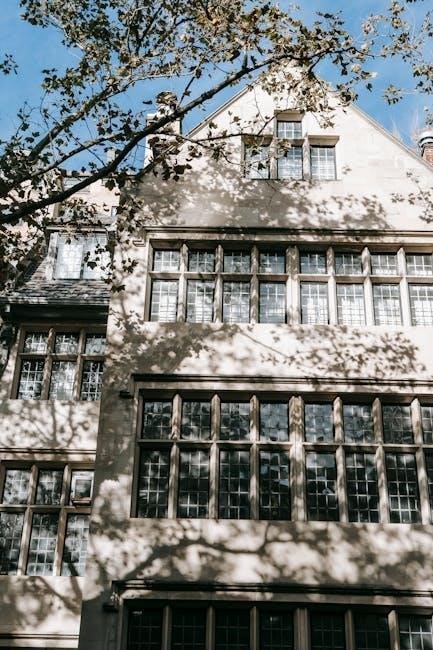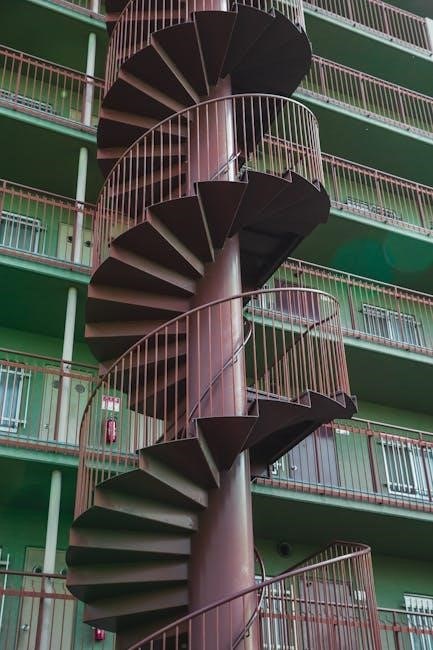nj property tax rate by town 2024 pdf
- Published
- in PDF
New Jersey’s 2024 property tax rates remain among the highest nationwide, with towns like West New York and Bergenfield showing elevated rates. The average tax bill surpassed $10,000, reflecting rising property values and municipal costs. Detailed tax rate data for each town, including PDF reports, is available for review, providing insights into local assessments and relief programs like ANCHOR.
1.1 Overview of Property Tax System in New Jersey
New Jersey’s property tax system is managed by county and municipal governments, with tax rates determined annually based on property assessments. Tax bills are calculated by multiplying assessed property values by the tax rate. The system allows for variations in tax rates across towns, reflecting local budget needs and property values. Detailed reports for each town are available, ensuring transparency for residents.
1.2 Importance of Understanding Tax Rates by Town
Understanding tax rates by town is crucial for homeowners and investors, as rates vary significantly due to local services, school funding, and infrastructure. High-tax towns like West New York and Bergenfield reflect higher property values and municipal costs. Knowing these rates aids in budgeting and decision-making, especially with programs like ANCHOR offering relief. Detailed 2024 tax rate reports provide transparency and clarity for residents.

Methodology for Determining Property Tax Rates
New Jersey’s property tax system funds local services and schools, administered by counties and municipalities. Tax rates vary by town, influenced by property values and budget needs. Detailed town-level data is available in 2024 PDF reports, ensuring transparency for residents and policymakers.
2.1 How Tax Rates Are Calculated
Property tax rates in New Jersey are calculated by dividing the municipal budget by the total assessed property value, yielding the general tax rate per $100 of assessed value. This rate varies by town, reflecting local spending and property valuations. Effective tax rates also consider exemptions and equalization ratios, ensuring fairness across taxing districts. Detailed calculations are outlined in 2024 PDF reports available from state sources.
2.2 Role of County and Municipal Governments
County and municipal governments in New Jersey set tax rates based on budget needs and property assessments. Counties distribute taxes to fund regional services, while municipalities allocate funds for local services, schools, and infrastructure. Both levels ensure tax uniformity and compliance, with detailed roles and responsibilities outlined in 2024 tax rate PDF reports available for public review.
2.3 Factors Influencing Tax Rates
Property tax rates in New Jersey are influenced by local budget requirements, property values, and state regulations. Municipal spending, school district costs, and economic conditions also play a role. Tax rates vary by town, as shown in 2024 PDF reports, reflecting each area’s unique financial needs and assessment practices, ensuring accurate tax calculations for homeowners.

Highest Property Tax Rates in New Jersey Towns 2024
Towns like West New York and Bergenfield top the list with the highest property tax rates in 2024. These areas reflect elevated tax burdens due to local assessments and municipal costs, as detailed in the PDF reports for New Jersey towns.
3.1 List of Towns with Highest Tax Rates
West New York, Bergenfield, and Secaucus lead as towns with the highest property tax rates in 2024. Their tax rates exceed regional averages, driven by local assessments and municipal costs. Detailed PDF reports highlight these towns, offering insights into their tax structures and how they compare across New Jersey.
3.2 Comparative Analysis of Tax Rates Across Towns
Tax rates vary significantly across New Jersey towns, with West New York and Bergenfield showing higher rates compared to Alpine and Bogota. Factors like local assessments, municipal costs, and property values drive these differences. Detailed 2024 PDF reports reveal these variations, offering insights into regional disparities and the impact of tax relief programs like ANCHOR.
Lowest Property Tax Rates in New Jersey Towns 2024
Towns like Alpine and Bogota offer lower tax rates, with averages below 1.5%. These areas provide affordable options for homeowners, highlighting regional tax variations.
4.1 Towns with Most Affordable Tax Rates
Towns like Alpine and Bogota offer the lowest tax rates in New Jersey, averaging below 1.5%. These municipalities provide affordable options for homeowners, with reduced financial burdens. The tax rates vary significantly across regions, making areas like Alpine particularly attractive due to their lower assessment ratios and reduced tax liabilities, offering relief to residents seeking budget-friendly living solutions.
4.2 Reasons for Variations in Tax Rates
Variations in New Jersey’s property tax rates stem from differences in local budgets, school funding, and municipal services. Towns with higher property values often have lower tax rates, while areas with lower valuations may impose higher rates. Economic conditions and state aid allocations also influence these disparities, creating a diverse tax landscape across the state’s municipalities, reflecting local needs and fiscal priorities.
County-Level Property Tax Rates 2024
New Jersey’s 2024 county-level property tax rates vary significantly, with Bergen County at 2.109 and Hudson County towns like West New York reaching 8.259, showcasing regional disparities in taxation.
5.1 Bergen County Tax Rates
Bergen County’s 2024 tax rates vary by municipality, with towns like Allendale at 2.109, Alpine at 0.818, and Bergenfield at 3.527. These rates reflect local property values and municipal services, with detailed reports available in PDF format for each town, providing a clear breakdown of tax assessments and their allocations.
5.2 Hudson County Tax Rates
Hudson County’s 2024 tax rates show significant variation, with towns like West New York at 8.259, Union City at 1.848, and Secaucus at 4.092. These rates are influenced by local property assessments and municipal budgets, detailed in available PDF reports, which also outline tax relief options and payment schedules for residents.
5.3 Other Counties’ Tax Rates
Other New Jersey counties exhibit diverse tax rates in 2024, with Bergen County towns like Mahwah at 2.037 and Paramus at 1.514. These rates, detailed in official PDF reports, reflect local property values and municipal spending, offering insights into regional tax trends and variations across the state.

Impact of Property Tax Rates on Homeowners
New Jersey’s high property tax rates significantly affect homeowners, with average bills exceeding $10,000 in 2024. This financial strain influences budgeting and housing affordability across the state.
6.1 Average Property Tax Bill in New Jersey
New Jersey’s average property tax bill surpassed $10,000 for the first time in 2024, reflecting rising property values and increased municipal costs. This milestone highlights the financial burden on homeowners across the state, with nine counties reporting average bills exceeding this threshold, making it a critical concern for residents and policymakers alike.
6.2 Tax Relief Programs for Homeowners
New Jersey offers relief programs like the ANCHOR initiative to help homeowners manage high property taxes. Eligible residents receive rebates, reducing their tax burden. These programs aim to alleviate financial strain, especially for seniors and middle-income families, ensuring affordability and supporting homeownership across the state.

Tax Relief Programs in New Jersey 2024
New Jersey’s 2024 tax relief programs, including the ANCHOR initiative, provide rebates to eligible homeowners, offering financial relief from high property taxes and supporting affordability statewide.
7;1 ANCHOR Property Tax Relief Program
The ANCHOR program provides significant property tax relief to eligible New Jersey homeowners and renters, offering rebates based on income limits; Launched in 2023, it aims to reduce the financial burden of high property taxes. Homeowners earning up to $250,000 and renters earning up to $100,000 are eligible. Applications are accepted until December 31, 2024, with benefits distributed annually to support affordability.
7.2 Eligibility and Benefits
Eligibility for the ANCHOR program is based on income limits, with homeowners earning up to $250,000 and renters up to $100,000 qualifying. Benefits include rebates on property taxes, with amounts varying by income tier. Applications are accepted until December 31, 2024, ensuring relief for eligible residents. Additional deductions are available for seniors, disabled individuals, and surviving spouses, enhancing affordability for vulnerable groups while adhering to state guidelines.
Historical Trends in New Jersey Property Tax Rates
New Jersey property tax rates have steadily increased over the past decade, with 2024 showing a notable rise due to rising property values and municipal costs.
8.1 10-Year Tax Rate History
Over the past decade, New Jersey’s property tax rates have shown a steady upward trend. The average equalized tax rate rose from 1.867% in 2014 to 2.021% in 2022. Municipalities like Allendale and Bergenfield experienced significant increases, reflecting rising property values and municipal costs. This trend highlights the consistent growth in tax burdens across the state.
8.2 Changes in Tax Rates Over Time
New Jersey’s property tax rates have consistently increased over the past decade, driven by rising property values and municipal costs. Towns like West New York and Bergenfield saw significant rate hikes, while others experienced more moderate growth. This upward trend reflects the state’s ongoing challenges in balancing revenue needs with taxpayer affordability, prompting initiatives like the ANCHOR program to provide relief.

How to Access 2024 Property Tax Rate Data
Access 2024 New Jersey property tax rate data through official PDF reports, available on county websites. Bergen and Hudson counties provide detailed tax rate breakdowns for each town.
9.1 Official Sources for Tax Rate PDFs
Official sources for 2024 New Jersey property tax rate PDFs include county government websites and the New Jersey Department of Community Affairs. These documents provide detailed tax rates for each municipality, including Bergen and Hudson counties. They are accessible online and offer comprehensive data for residents and researchers to review and analyze.
9.2 Steps to Download Tax Rate Reports
To download 2024 New Jersey property tax rate reports, visit the official county websites or the New Jersey Department of Community Affairs. Navigate to the “Taxation” or “Property Tax” section, locate the 2024 tax rate PDFs, and click to download. Ensure the document includes town-specific data for accurate review and analysis of local tax rates.
Municipal Tax Assessments and Appeals
Municipal tax assessments determine property values for taxation. Homeowners can appeal assessments if they believe the valuation is incorrect. The process involves submitting evidence to local tax boards for review and potential adjustment, ensuring fair property tax calculations based on accurate assessments.
10.1 Process of Tax Assessments
The tax assessment process involves evaluating property values annually by municipal assessors. Assessments consider market trends, property improvements, and exemptions. Each town’s tax rate is applied to the assessed value, determining the tax bill. The process ensures equitable taxation based on current property values, with adjustments made for exemptions and appeals, maintaining transparency and accuracy in calculations.
10.2 How to Appeal Tax Assessments
Property owners can appeal tax assessments by filing an appeal form with the county tax board. The process involves reviewing the assessed value, submitting evidence of discrepancies, and attending a hearing. Taxpayers must provide documentation, such as appraisals or comparable sales, to support their case. Appeals must be filed by the designated deadline to ensure consideration for tax relief.

Property Tax Payment Schedule 2024
Property taxes are due quarterly on February 1, May 1, August 1, and November 1. Late payments incur fees, emphasizing timely payments to avoid penalties.
11.1 Quarterly Payment Due Dates
New Jersey mandates quarterly property tax payments due on February 1, May 1, August 1, and November 1. These fixed dates ensure consistent revenue for municipalities, with late payments incurring penalties. Timely payments are crucial to avoid additional fees and maintain compliance with state tax regulations.
11.2 Consequences of Late Payments
Missing New Jersey’s quarterly tax payments results in penalties, including an 8% annual interest charge on unpaid balances. Additional late fees apply, and prolonged delinquency can lead to tax liens or property seizures. Prompt payment is essential to avoid financial penalties and legal complications, ensuring compliance with state tax regulations.

Measures of Property Tax Uniformity
New Jersey uses assessment ratios and equalization rates to ensure uniform property tax distribution. Average tax rates and uniformity measures vary by county, ensuring fair taxation across towns.
12.1 Assessment Uniformity in Taxing Districts
New Jersey employs equalization ratios to maintain assessment uniformity across taxing districts. This ensures properties are valued consistently, preventing disparities in tax burdens. Counties like Bergen and Hudson have implemented measures to standardize assessments, promoting fairness and transparency in property taxation. Uniformity is crucial for equitable tax distribution and maintaining trust in the system.
12.2 County-Wide Uniformity Measures
New Jersey counties enforce uniformity through standardized assessment practices and equalization ratios. Bergen County, for instance, ensures consistent property valuations, while Hudson County maintains strict oversight of municipal tax assessors. These measures aim to reduce variability, ensuring fair tax distribution and compliance with state regulations, thereby enhancing the overall integrity of the property tax system across all regions.

Frequently Asked Questions
13.1 General FAQs on Property Tax
Common questions include how tax rates are determined, payment due dates, and assessment processes. Homeowners often inquire about tax relief programs like ANCHOR and eligibility criteria. Additional FAQs cover tax bill calculations, payment methods, and available deductions, with detailed information accessible via official PDF resources and government websites.
Common questions include how tax rates are calculated, payment due dates, and eligibility for relief programs like ANCHOR; Homeowners often ask about assessment processes, tax bill calculations, and deductions. FAQs also cover tax payment methods, available exemptions, and how to appeal assessments. Detailed answers are provided in official PDF resources and government websites for clarity and guidance.
13.2 FAQs on Tax Relief and Budgets
Frequently asked questions cover eligibility for the ANCHOR program, tax relief benefits, and state budget allocations. Homeowners inquire about income limits, application deadlines, and required documentation. Budget-related questions address how tax revenues are distributed and the impact of state funding on local property taxes. Detailed answers are available in official PDF guides and NJ Treasury resources.
